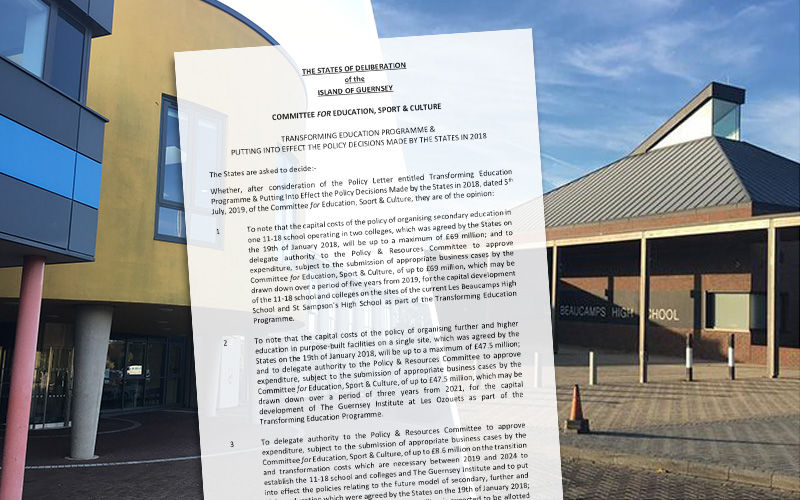


Four Deputies have called for a halt to any debate on the future of education until the committee responsible provides "the detail required to justify one of the biggest States spends in this political term".
Deputies Andrea Dudley-Owen and Rob Prow have laid an amendment and sursis against Education's proposed reforms, as have Deputies Carl Meerveld and Barry Paint.
All four Deputies believe that Education needs to produce more detailed comparison with alternative education models specific to Guernsey so that the States can have a fully-informed debate in November, rather than the scheduled date in just two weeks time.
Deputy Meerveld outlined the terms of his sursis to the media and public last week, and has been in an ongoing feud with the Education Committee in recent weeks over their secondary school proposals and a contentious recruitment process for a newly-created senior position.
For soooo many reasons, further delay would be really troublesome. We all need to move forward, for the students of today & tomorrow https://t.co/7vLDTGMqtq
— louise misselke #FE (@louisemisselke) August 27, 2019
Pictured: College of FE Principal Louise Misselke has warned against further delays to a decision on the future of education.
Deputies Dudley-Owen and Prow have been researching an amendment to the committee's one school, two colleges proposal since 14 July.
They feel the recently published programme business case lacks the detail required to justify an investment of nearly £160 million, and want to ensure that States members can appraise Education's proposals against known and already researched, familiar models of education that are specific to Guernsey.
Deputy Dudley-Owen said the long delay in receiving requested comparative information from the committee over the summer holidays has resulted in them laying a Sursis Motivé - a delaying motion - as well as an amendment.
"The Committee have given us a timeline of events in their Programme Business Case and they intend to have their first Outline Business Case, which is a more detailed document, ready by October. We are calling for them to return to the States with this document using the specified models as comparisons against their own preference so that Deputies and the public can clearly see the merits and disadvantages of the known systems against each other.
"The details that have been presented by the Committee to date are insufficient for us to make such a significant decision with an extremely high price tag of £157m attached. We are asking for the evidence that the preferred model has significant advantages over the other models that we are familiar with in Guernsey.”

Pictured: Education's proposals are set to be debated on 4 September.
Deputy Prow said the alternative options shortlisted in Education's Programme Business Case were not genuine alternatives - one was the interim, transitional arrangement, and the other an alternative version of the one school on two sites model.
“In the same way you would expect the foundations of a house to be laid before you start building the walls, you would expect a Programme Business Case to have been drafted before the policy letter, so that the latter document which is used for “selling” the plan has all of the hard facts and figures contained within it and presented in a more accessible readable format.
"Instead, the Programme Business Case has come six weeks after the policy letter was first published. We don’t believe that the options appraisal as presented provides the right comparisons against which the States need to judge the Committees preferred model. The States can only make an objective decision if the known models are presented side by side.”
Pictured top: Deputies Barry Paint, Andrea Dudley-Owen, Rob Prow and Carl Meerveld.
Comments
Comments on this story express the views of the commentator only, not Bailiwick Publishing. We are unable to guarantee the accuracy of any of those comments.